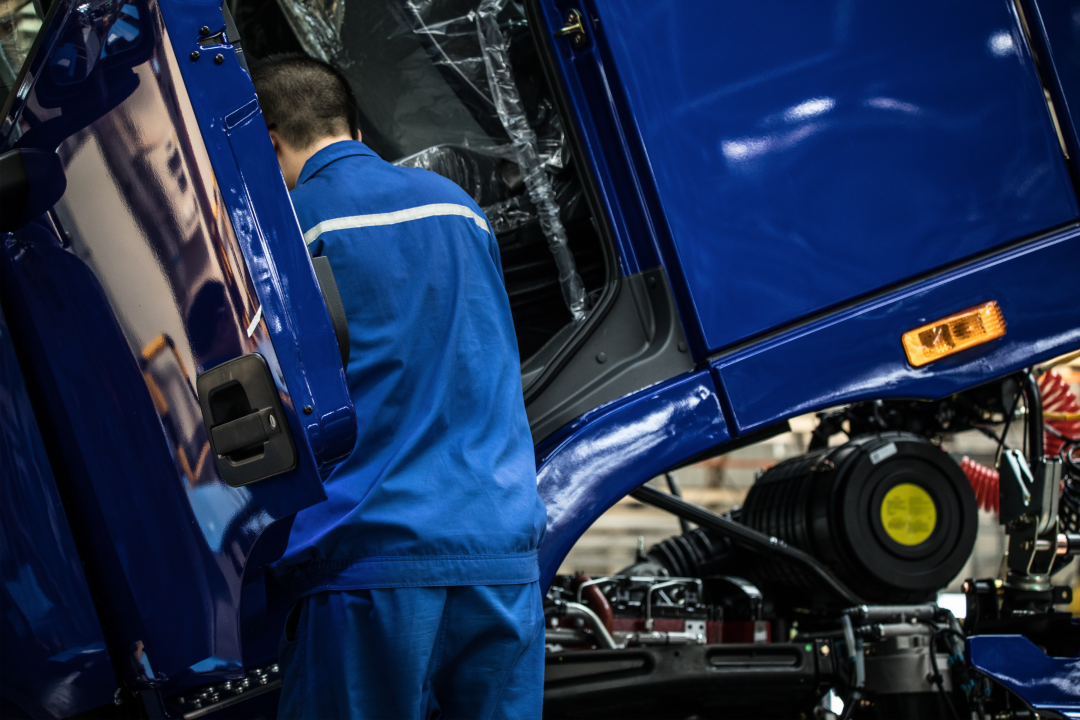
Susie Jones
Truckers with disabilities - what support is available?
Creat: 12.08.2024
•
Actualizat: 12.08.2024
In the UK, 23% of the working-age population reported they were disabled - unbeknownst to many, a good proportion consists of truck drivers traversing endlessly across Europe to deliver your goods. Despite facing many challenges, their presence in the trucking community highlights the importance of inclusion and diversity in the industry.
If I have a disability, can I drive a truck?
If you have a physical or cognitive disability, you can drive a heavy goods vehicle. However, you must pass a medical examination to determine whether you are fit enough. A medical consists of the following:
• A discussion with a doctor regarding your health: Drivers must be honest and open.
• A physical examination where your doctor will check:
• Blood pressure
• Heart
• Vision
• Test for diabetes
• Neurological conditions
• Sleep disorders.
Once completed, the DVLA will decide whether you can drive.
Truck adjustments
For drivers with physical disabilities, the following modifications are available:
• Hand controls to replace pedals
• Steering aids
• Left-foot accelerators
• Clutch conversion
• Harnesses
• Specialised seating
• Wheelchair stowage equipment.
In 2021, HGV manufacturer MAN adapted four trucks for disabled drivers. The adaptations involved equipping the trucks with a lifting platform for wheelchair users to easily access the cabin - with all controls fitted on or around the steering wheel.
Although technology and adaptations are advancing in the industry, many disabled drivers still face challenges on the job.

What obstacles do disabled truck drivers face?
It can be trying for disabled drivers to get a look into the industry even if they have the required qualifications and have passed their medical. Many companies are reluctant to provide an adapted vehicle - as these can be a costly investment.
For drivers willing to pay for the necessary adaptations, Andy, CEO of the charity Globe Truckers UK, states it's still challenging to find employment.
"Some haulage companies are reluctant to employ disabled people - they are often wary of the obstacles drivers face outside of the cab, for example, stairs and lifting."
David Chambers, a disabled HGV driver, has spoken out against the trials he faces daily and has called for reasonable adjustments to the Equality Act - especially after the Government called for more people on disability benefits to return to work.
David and many others find it difficult at large depots where, under the Equality Act, the depot is not obliged to make reasonable adjustments for drivers with disabilities. For safety reasons, they must wait away from their trucks while unloading, resulting in walking long distances and climbing stairs.
What support is there for disabled truck drivers?
Finding support can be laborious for those with life-altering injuries or illnesses. UK charity Globe Truckers was built purposefully by drivers to help drivers - providing support for the injured, sick, or disabled.
"A lot of disabled or injured drivers don't know where to turn to as there is very little information out there for them. That is where we come in and offer our support and guidance - whether it's pointing them to the right people or providing funding for equipment."
"Some drivers just need someone to talk to, and we're here to offer them that support in any way possible. In the future, we would love to be able to fund truck adaptations for drivers. Adaptations can be very costly, and most disabled drivers have to pay out of their own pocket for them. To achieve this, we need more funding and support from those in the industry," states Andy.
How can the industry help?
For a more inclusive and diverse landscape, the industry must do more to accommodate physical and cognitive disabilities - a change that must happen soon, says Andy.
"It's vital the industry puts their support and time back into itself, whether directly to disabled drivers or charities like Globe Truckers. The industry can't expect to appeal to people if they don't provide support for minorities."
As a haven for many drivers, truck stops can pave the way by providing accessible facilities. In 2022, the Government invested £100 million into the industry to improve roadside facilities and create safer truck parks.

The Government funding could enhance accessibility for disabled drivers at popular stops. Changes such as the following could make a substantial impact:
• Wheelchair-accessible parking spaces: drivers who find it hard to get in and out of the cab need extra space - especially for those needing a hoist.
• Accessible amenities: accessible restaurants, restrooms, and other facilities ensure an inclusive environment.
Fleet companies can assist with creating a more inclusive environment by implementing the following measures:
• Modifying trucks - enabling easy operation for disabled drivers via hand controls and adaptive technologies.
• Support and training - providing courses to address specific challenges or needs.
• Inclusive hiring practices - taking a non-biased approach when hiring promotes an inclusive and diverse culture.
Providing a diverse and inclusive culture is vital to attracting more drivers into the haulage industry. Support for those with physical and cognitive disabilities has been overlooked by the industry - leaving many drivers unsure of where to turn to. Disabled drivers offer a unique point of view and adaptability that is a welcome change to the industry
What to do if you become disabled during your career?
If you develop a "notifiable" medical condition or disability, you must make the DVLA aware - the DVLA will do the following:
• Decide by letter - some circumstances may require more information.
• Assess your medical condition and decide the outcome.
• If you need to adapt your vehicle, you will need an independent assessment of your adaptations.
• If you must stop driving, the DVLA will give you a medical reason why.



